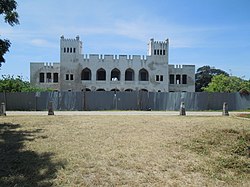Bagamoyo
| Bagamoyo | |
|---|---|

German Boma
|
|
| Location in Tanzania | |
| Coordinates: 6°26′S 38°54′E / 6.433°S 38.900°ECoordinates: 6°26′S 38°54′E / 6.433°S 38.900°E | |
| Country |
|
| Region | Pwani Region |
| Population | |
| • Total | 30,000 |
| Time zone | East Africa Time (UTC+3) |
| Climate | Aw |
Bagamoyo, Tanzania, is a town founded at the end of the 18th century. It was (also spelled Bagamojo) the original capital of German East Africa and was one of the most important trading ports along the East African coast. Now, the town has about 30,000 inhabitants and is the capital of the Bagamoyo District, which was recently considered as a World Heritage Site.
Bagamoyo is located at 6°26′S 38°54′E / 6.433°S 38.900°E. It lies 75 kilometres (47 miles) north of Dar-es-Salaam on the coast of the Indian Ocean, close to the island of Zanzibar.
Bagamoyo was the most important trading entrepot of the east central coast of Africa in the late 19th century. Bagamoyo's history has been influenced by Indian and Arab traders, by the German colonial government and by Christian missionaries. About 5 km (3 mi) south of Bagamoyo, the Kaole Ruins with remnants of two mosques and a couple of tombs can be dated back to the 13th century, showing the importance of Islam in those early Bagamoyo times. Until the middle of the 18th century, Bagamoyo was a small and insignificant trading center where most of the population were fishermen and farmers. The main trading goods were fish, salt, and gum, among other things.
In the late 18th century Muslim families settled in Bagamoyo, all of which were relatives of Shamvi la Magimba in Oman. They made their living by enforcing taxes on the native population and by trading in salt, gathered from the Nunge coast north of Bagamoyo. In the first half of the 19th century, Bagamoyo became a trading port for ivory and the slave trade, with traders coming from the African interior, from places as far as Morogoro, Lake Tanganyika and Usambara on their way to Zanzibar. This explains the meaning of the word Bagamoyo ("Bwaga-Moyo") which means "Lay down your Heart" in Swahili. It is disputed whether this refers to the slave trade which passed through the town (i.e. "give up all hope") or to the porters who rested in Bagamoyo after carrying 35 lb cargos on their shoulders from the Great Lakes region (i.e. "take the load off and rest"). Since there is little evidence to support that Bagamoyo was a major slave port (Kilwa, much further south, has earned this status), and that tens of thousands of porters arrived at Bagamoyo annually in the latter half of the 19th century, it is more likely that the name of the town derives from the latter interpretation.
...
Wikipedia

